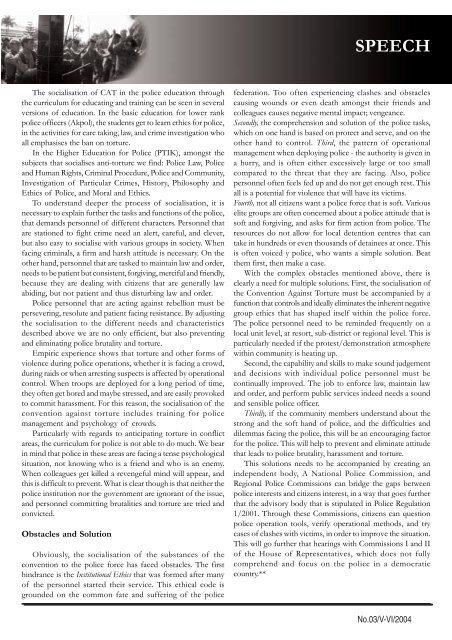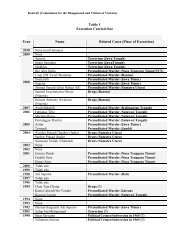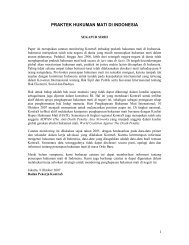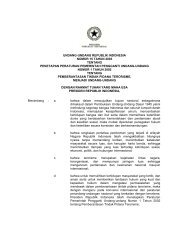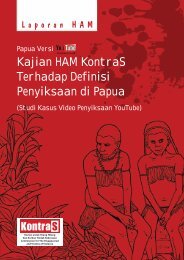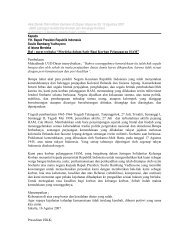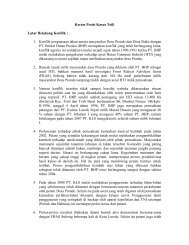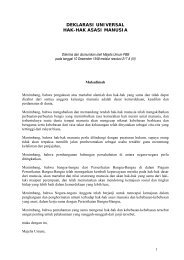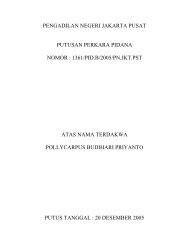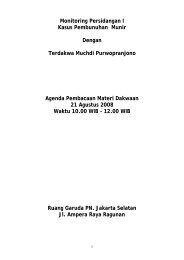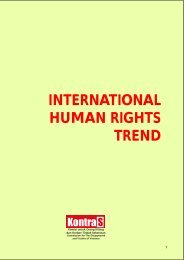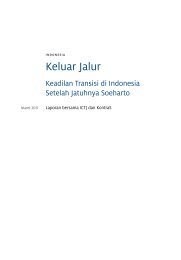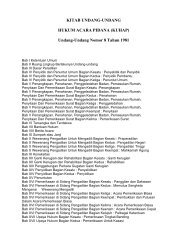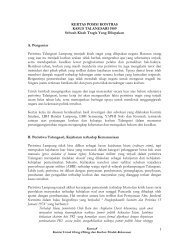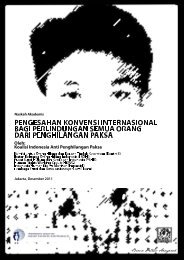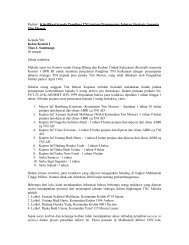buku kontras 1.pmd
buku kontras 1.pmd
buku kontras 1.pmd
You also want an ePaper? Increase the reach of your titles
YUMPU automatically turns print PDFs into web optimized ePapers that Google loves.
SPEECH<br />
The socialisation of CAT in the police education through<br />
the curriculum for educating and training can be seen in several<br />
versions of education. In the basic education for lower rank<br />
police officers (Akpol), the students get to learn ethics for police,<br />
in the activities for care taking, law, and crime investigation who<br />
all emphasises the ban on torture.<br />
In the Higher Education for Police (PTIK), amongst the<br />
subjects that socialises anti-torture we find: Police Law, Police<br />
and Human Rights, Criminal Procedure, Police and Community,<br />
Investigation of Particular Crimes, History, Philosophy and<br />
Ethics of Police, and Moral and Ethics.<br />
To understand deeper the process of socialisation, it is<br />
necessary to explain further the tasks and functions of the police,<br />
that demands personnel of different characters. Personnel that<br />
are stationed to fight crime need an alert, careful, and clever,<br />
but also easy to socialise with various groups in society. When<br />
facing criminals, a firm and harsh attitude is necessary. On the<br />
other hand, personnel that are tasked to maintain law and order,<br />
needs to be patient but consistent, forgiving, merciful and friendly,<br />
because they are dealing with citizens that are generally law<br />
abiding, but not patient and thus disturbing law and order.<br />
Police personnel that are acting against rebellion must be<br />
persevering, resolute and patient facing resistance. By adjusting<br />
the socialisation to the different needs and characteristics<br />
described above we are no only efficient, but also preventing<br />
and eliminating police brutality and torture.<br />
Empiric experience shows that torture and other forms of<br />
violence during police operations, whether it is facing a crowd,<br />
during raids or when arresting suspects is affected by operational<br />
control. When troops are deployed for a long period of time,<br />
they often get bored and maybe stressed, and are easily provoked<br />
to commit harassment. For this reason, the socialisation of the<br />
convention against torture includes training for police<br />
management and psychology of crowds.<br />
Particularly with regards to anticipating torture in conflict<br />
areas, the curriculum for police is not able to do much. We bear<br />
in mind that police in these areas are facing a tense psychological<br />
situation, not knowing who is a friend and who is an enemy.<br />
When colleagues get killed a revengeful mind will appear, and<br />
this is difficult to prevent. What is clear though is that neither the<br />
police institution nor the government are ignorant of the issue,<br />
and personnel committing brutalities and torture are tried and<br />
convicted.<br />
Obstacles and Solution<br />
Obviously, the socialisation of the substances of the<br />
convention to the police force has faced obstacles. The first<br />
hindrance is the Institutional Ethics that was formed after many<br />
of the personnel started their service. This ethical code is<br />
grounded on the common fate and suffering of the police<br />
federation. Too often experiencing clashes and obstacles<br />
causing wounds or even death amongst their friends and<br />
colleagues causes negative mental impact; vengeance.<br />
Secondly, the comprehension and solution of the police tasks,<br />
which on one hand is based on protect and serve, and on the<br />
other hand to control. Third, the pattern of operational<br />
management when deploying police - the authority is given in<br />
a hurry, and is often either excessively large or too small<br />
compared to the threat that they are facing. Also, police<br />
personnel often feels fed up and do not get enough rest. This<br />
all is a potential for violence that will have its victims.<br />
Fourth, not all citizens want a police force that is soft. Various<br />
elite groups are often concerned about a police attitude that is<br />
soft and forgiving, and asks for firm action from police. The<br />
resources do not allow for local detention centres that can<br />
take in hundreds or even thousands of detainees at once. This<br />
is often voiced y police, who wants a simple solution. Beat<br />
them first, then make a case.<br />
With the complex obstacles mentioned above, there is<br />
clearly a need for multiple solutions. First, the socialisation of<br />
the Convention Against Torture must be accompanied by a<br />
function that controls and ideally eliminates the inherent negative<br />
group ethics that has shaped itself within the police force.<br />
The police personnel need to be reminded frequently on a<br />
local unit level, at resort, sub-district or regional level. This is<br />
particularly needed if the protest/demonstration atmosphere<br />
within community is heating up.<br />
Second, the capability and skills to make sound judgement<br />
and decisions with individual police personnel must be<br />
continually improved. The job to enforce law, maintain law<br />
and order, and perform public services indeed needs a sound<br />
and sensible police officer.<br />
Thirdly, if the community members understand about the<br />
strong and the soft hand of police, and the difficulties and<br />
dilemmas facing the police, this will be an encouraging factor<br />
for the police. This will help to prevent and eliminate attitude<br />
that leads to police brutality, harassment and torture.<br />
This solutions needs to be accompanied by creating an<br />
independent body, A National Police Commission, and<br />
Regional Police Commissions can bridge the gaps between<br />
police interests and citizens interest, in a way that goes further<br />
that the advisory body that is stipulated in Police Regulation<br />
1/2001. Through these Commissions, citizens can question<br />
police operation tools, verify operational methods, and try<br />
cases of clashes with victims, in order to improve the situation.<br />
This will go further that hearings with Commissions I and II<br />
of the House of Representatives, which does not fully<br />
comprehend and focus on the police in a democratic<br />
country.**<br />
No.03/V-VI/2004


